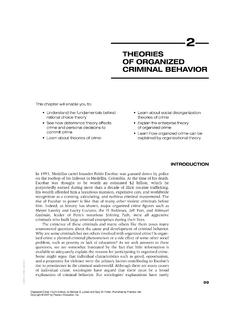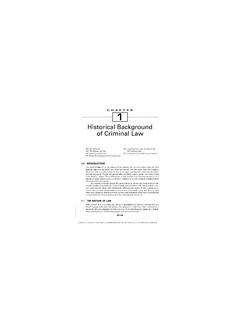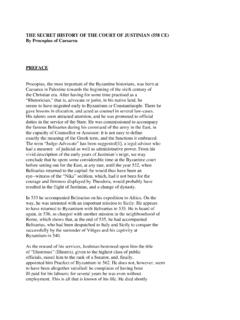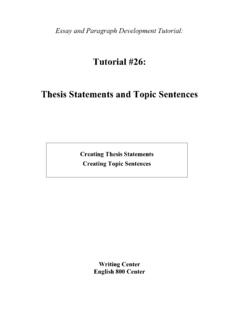Transcription of Histories of Herodotus
1 THE HISTORY OF Herodotus . Translated into English by G. C. MACAULAY, IN TWO VOLUMES. VOLUME I. {e Herodotou diathesis en apasin epieikes, kai tois men agathois sunedomene, tois de kakois sunalgousa}.--Dion. Halic. {monos 'Erodotos 'Omerikhotatos egeneto}.--Longinus. PREPARER'S NOTE. This text was prepared from an edition dated 1890, published by MacMillan and Co., London and New York. Greek text has been transliterated and marked with brackets, as in the opening citation above. PREFACE. If a new translation of Herodotus does not justify itself, it will hardly be justified in a preface; therefore the question whether it was needed may be left here without discussion. The aim of the translator has been above all things faithfulness--faithfulness to the manner of expression and to the structure of sentences, as well as to the meaning of the Author.
2 At the same time it is conceived that the freedom and variety of Herodotus is not always best reproduced by such severe consistency of rendering as is perhaps desirable in the case of the Epic writers before and the philosophical writers after his time: nor again must his simplicity of thought and occasional quaintness be reproduced in the form of archaisms of language; and that not only because the affectation of an archaic style would necessarily be offensive to the reader, but also because in language Herodotus is not archaic. His style is the "best canon of the Ionic speech," marked, however, not so much by primitive purity as by eclectic variety. At the same time it is characterised largely by the poetic diction of the Epic and Tragic writers; and while the translator is free to employ all the resources of modern English, so far as he has them at his command, he must carefully retain this poetical colouring and by all means avoid the courtier phrase by which the style of Herodotus has too often been made "more noble.
3 "[1]. As regards the text from which this translation has been made, it is based upon that of Stein's critical edition (Berlin, 1869-1871), that is to say the estimate there made of the comparative value of the authorities has been on the whole accepted as a just one, rather than that which depreciates the value of the Medicean MS. and of the class to which it belongs. On the other hand the conjectural emendations proposed by Stein have very seldom been adopted, and his text has been departed from in a large number of other instances also, which will for the most part be found recorded in the notes. As it seemed that even after Stein's re-collation of the Medicean MS. there were doubts felt by some scholars[2] as to the true reading in some places of this MS., which is very generally acknowledged to be the most important, I thought it right to examine it myself in all those passages where questions about text arise which concern a translator, that is in nearly five hundred places altogether; and the results, when they are worth observing, are recorded in the notes.
4 At the same time, by the suggestion of Dr. Stein, I re-collated a large part of the third book in the MS. which is commonly referred to as F. ( Florentinus), called by Stein C, and I examined this MS. also in a certain number of other places. It should be understood that wherever in the notes I mention the reading of any particular MS. by name, I do so on my own authority. The notes have been confined to a tolerably small compass. Their purpose is, first, in cases where the text is doubtful, to indicate the reading adopted by the translator and any other which may seem to have reasonable probability, but without discussion of the authorities; secondly, where the rendering is not quite literal (and in other cases where it seemed desirable), to quote the words of the original or to give a more literal version; thirdly, to add an alternative version in cases where there seems to be a doubt as to the true meaning; and lastly, to give occasionally a short explanation, or a reference from one passage of the author to another.
5 For the orthography of proper names reference may be made to the note prefixed to the index. No consistent system has been adopted, and the result will therefore be open to criticism in many details; but the aim has been to avoid on the one hand the pedantry of seriously altering the form of those names which are fairly established in the English language of literature, as distinguished from that of scholarship, and on the other hand the absurdity of looking to Latin rather than to Greek for the orthography of the names which are not so established. There is no intention to put forward any theory about pronunciation. The index of proper names will, it is hoped, be found more complete and accurate than those hitherto published. The best with which I was acquainted I found to have so many errors and omissions[3] that I was compelled to do the work again from the beginning.
6 In a collection of more than ten thousand references there must in all probability be mistakes, but I trust they will be found to be few. My acknowledgments of obligation are due first to Dr. Stein, both for his critical work and also for his most excellent commentary, which I. have had always by me. After this I have made most use of the editions of Kr ger, B hr, Abicht, and (in the first two books) Mr. Woods. As to translations, I have had Rawlinson's before me while revising my own work, and I have referred also occasionally to the translations of Littlebury (perhaps the best English version as regards style, but full of gross errors), Taylor, and Larcher. In the second book I have also used the version of B. R. reprinted by Mr. Lang: of the first book of this translation I have access only to a fragment written out some years ago, when the British Museum was within my reach.
7 Other particular obligations are acknowledged in the notes. ---------- NOTES TO PREFACE. [1] See the remarks of Courier (on Larcher's version) in the preface to his specimens of a new translation of Herodotus (/ uvres compl tes de Courier/, Bruxelles, 1828). [2] Mr. Woods, for example, in his edition of the first book (published in 1873) gives a list of readings for the first and second books, in which he almost invariably prefers the authority of Gronovius to that of Stein, where their reports differ. In so doing he is wrong in all cases (I think) except one, namely i. 134. {to degomeno}. He is wrong, for examine, in i. 189, where the MS. has {touto}, i. 196 {an agesthai}, i. 199 {odon}, ii. 15 {te de}, ii. 95 {up auto}, ii. 103 {kai prosotata}, ii. 124 {to addo}. (without {dao}), ii. 181 {no}. Abicht also has made several inaccurate statements, i.
8 185, where the MS. has {es ton Euphreten}, and vii. 133 {Xerxes}. [3] For example in the index of proper names attached to Stein's annotated edition (Berlin, 1882), to which I am under obligation, having checked my own by it, I find that I have marked upwards of two hundred mistakes or oversights: no doubt I have been saved by it from at least as many. THE HISTORY OF Herodotus . BOOK I. THE FIRST BOOK OF THE Histories , CALLED CLIO. This is the Showing forth of the Inquiry of Herodotus of Halicarnassos, to the end that[1] neither the deeds of men may be forgotten by lapse of time, nor the works[2] great and marvellous, which have been produced some by Hellenes and some by Barbarians, may lose their renown; and especially that the causes may be remembered for which these waged war with one another. 1. Those of the Persians who have knowledge of history declare that the Phenicians first began the quarrel.
9 These, they say, came from that which is called the Erythraian Sea to this of ours; and having settled in the land where they continue even now to dwell, set themselves forthwith to make long voyages by sea. And conveying merchandise of Egypt and of Assyria they arrived at other places and also at Argos; now Argos was at that time in all points the first of the States within that land which is now called Hellas;--the Phenicians arrived then at this land of Argos, and began to dispose of their ship's cargo: and on the fifth or sixth day after they had arrived, when their goods had been almost all sold, there came down to the sea a great company of women, and among them the daughter of the king; and her name, as the Hellenes also agree, was Io the daughter of Inachos. These standing near to the stern of the ship were buying of the wares such as pleased them most, when of a sudden the Phenicians, passing the word from one to another, made a rush upon them; and the greater part of the women escaped by flight, but Io and certain others were carried off.
10 So they put them on board their ship, and forthwith departed, sailing away to Egypt. 2. In this manner the Persians report that Io came to Egypt, not agreeing therein with the Hellenes,[3] and this they say was the first beginning of wrongs. Then after this, they say, certain Hellenes (but the name of the people they are not able to report) put in to the city of Tyre in Phenicia and carried off the king's daughter Europa;--these would doubtless be Cretans;--and so they were quits for the former injury. After this however the Hellenes, they say, were the authors of the second wrong; for they sailed in to Aia of Colchis and to the river Phasis with a ship of war, and from thence, after they had done the other business for which they came, they carried off the king's daughter Medea: and the king of Colchis sent a herald to the land of Hellas and demanded satisfaction for the rape[4] and to have his daughter back; but they answered that, as the Barbarians had given them no satisfaction for the rape of Io the Argive, so neither would they give satisfaction to the Barbarians for this.












